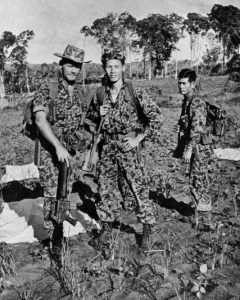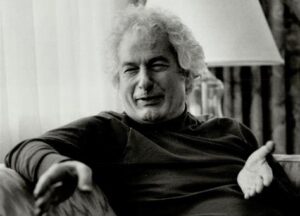Master Sergeant Donald Walter “Don” Duncan (1930-2009) was a Special Forces soldier during the Vietnam War, where he helped to establish Project DELTA. Following his return to the United States, Duncan became outspoken in his opposition to the war and was a leading anti-war spokesman. Duncan is best remembered as the military editor of the radical monthly magazine, Ramparts, during the Vietnam war, and for his testimony to the 1967 Russell Tribunal detailing American war crimes in Vietnam.
Medic has obtained the partial and redacted military records of Master Sergeant Duncan from the National Archives and Records Administration.
 Drafted into the Army in 1956, Duncan served as sergeant in Germany in operations and intelligence.He was sent to Vietnam in March 1964, serving with the 5th Special Forces Group and Project DELTA, which he helped to organize. In addition to briefing and debriefing incoming and outgoing troops, Duncan participated in 8-member intelligence and “hunter-killer” teams.
Drafted into the Army in 1956, Duncan served as sergeant in Germany in operations and intelligence.He was sent to Vietnam in March 1964, serving with the 5th Special Forces Group and Project DELTA, which he helped to organize. In addition to briefing and debriefing incoming and outgoing troops, Duncan participated in 8-member intelligence and “hunter-killer” teams.
He was highly decorated, receiving two Bronze Stars, the Air Medal, and the Vietnamese Cross of Gallantry. He was recommended for the Silver Star and the Legion of Merit as well as a field promotion to captain. Disillusioned with the reality of the war, Duncan declined the promotion and left the service at the end of his tour.
In Berkeley, California he became active in the anti-war movement and worked as a writer for Ramparts magazine, one of the leading publications of the New Left in America.
In the February 1966 issue of Ramparts, Duncan published The Whole Thing Was a Lie! a fierce critique of the Vietnam war. He explained his anti-war position by providing details on the American connection to the corrupt government of South Vietnam as well as atrocities committed by Americans. He further cited training in the use of torture in interrogations, and the use of Vietnamese proxies for the summary execution of POWs.
In 1967 Random House published a book written by Duncan entitled The New Legions which was sharply critical of the American military campaign in Vietnam.
Duncan also testified on American war crimes in Vietnam to the Russell Tribunal in Roskilde, Denmark in November 1967, where he was one of the first three former American soldiers to testify. There he detailed a de facto class in torture techniques conducted for members of the Special Forces entitled “Counter-Measures to Hostile Interrogation.”
In 1971 Duncan delivered the closing statement to the Winter Soldier Investigation conducted by Vietnam Veterans Against the War.
Duncan settled in Indiana around 1980 and in 1990 founded a nonprofit group that provided services for the poor. He died in a nursing home in Madison, Indiana on March 25, 2009.
His obituary appeared in the local paper but did not note his antiwar history. The New York Times ran an obit in May 2016, after discovering while pursuing an advance obituary that Duncan had died seven years earlier. The Times obit said Duncan “died in the obscurity of a small Midwestern town seven years ago, an all-but-forgotten soldier. He was 79. In an age of seeming information ubiquity, the news media will generally recall the lives of noteworthy people when they die. But Mr. Duncan’s death went largely unnoticed outside of Madison, Ind., the Ohio River town where he lived.”

Donald Duncan
Master Sergeant Donald Walter “Don” Duncan (1930-2009) was a Special Forces soldier during the Vietnam War, where he helped to establish Project DELTA. Following his return to the United States, Duncan became outspoken in his opposition to the war and was a leading anti-war spokesman. Duncan is best remembered as the military editor of the radical monthly magazine, Ramparts, during the Vietnam war, and for his testimony to the 1967 Russell Tribunal detailing American war crimes in Vietnam.
Medic has obtained the partial and redacted military records of Master Sergeant Duncan from the National Archives and Records Administration.
He was highly decorated, receiving two Bronze Stars, the Air Medal, and the Vietnamese Cross of Gallantry. He was recommended for the Silver Star and the Legion of Merit as well as a field promotion to captain. Disillusioned with the reality of the war, Duncan declined the promotion and left the service at the end of his tour.
In Berkeley, California he became active in the anti-war movement and worked as a writer for Ramparts magazine, one of the leading publications of the New Left in America.
In the February 1966 issue of Ramparts, Duncan published The Whole Thing Was a Lie! a fierce critique of the Vietnam war. He explained his anti-war position by providing details on the American connection to the corrupt government of South Vietnam as well as atrocities committed by Americans. He further cited training in the use of torture in interrogations, and the use of Vietnamese proxies for the summary execution of POWs.
In 1967 Random House published a book written by Duncan entitled The New Legions which was sharply critical of the American military campaign in Vietnam.
Duncan also testified on American war crimes in Vietnam to the Russell Tribunal in Roskilde, Denmark in November 1967, where he was one of the first three former American soldiers to testify. There he detailed a de facto class in torture techniques conducted for members of the Special Forces entitled “Counter-Measures to Hostile Interrogation.”
In 1971 Duncan delivered the closing statement to the Winter Soldier Investigation conducted by Vietnam Veterans Against the War.
Duncan settled in Indiana around 1980 and in 1990 founded a nonprofit group that provided services for the poor. He died in a nursing home in Madison, Indiana on March 25, 2009.
His obituary appeared in the local paper but did not note his antiwar history. The New York Times ran an obit in May 2016, after discovering while pursuing an advance obituary that Duncan had died seven years earlier. The Times obit said Duncan “died in the obscurity of a small Midwestern town seven years ago, an all-but-forgotten soldier. He was 79. In an age of seeming information ubiquity, the news media will generally recall the lives of noteworthy people when they die. But Mr. Duncan’s death went largely unnoticed outside of Madison, Ind., the Ohio River town where he lived.”